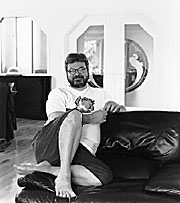
 |
 MICHEL TREMBLAY MICHEL TREMBLAYBard of Plateau Mont Royal From Writers of Montréal
"My first vision of the world was of these women who forgot that 1 was there and who said things they would never have said had they known I was listening," he told L'Actualite in May 1992. Elsewhere, alluding to the impact of privation and intellectual aridity on his extended family, he has said, "one or two people came out of it. Others were handicapped for life and today some of them haunt prisons and asylums." Michel Tremblay has mined both the emotional and physical terrain of his formative years in twenty-one plays and an extended cycle of novels, frequently using the same semi-autobiographical characters in both his drama and fiction. He has raised this cast to the level of universality and high art, even as they speak a joual whose cultural significance and linguistic validity have been a moot point in Quebec. (The Quebec government refused to pay travel expenses t the 1972 Paris engagement of Les Belles-soeurs because of its use of joual; amongTremblay's manyhonours is that of Chevalier de l'Ordre des Arts et des Lettres of France "pour avoir bien utilise la langue française .") As an avowed separatist, he refused to allow the performance of his plays in English in Montreal until after the Parti Québécois electoral win in 1976. They are now presented regularly at Stratford and across the country. In fact, Tremblay is the first Canadian playwright to achieve international renown. Critics have compared him to Molière and to Gabriel Garcia Marquez. His plays have been translated into, among other languages, Spanish, Polish, Yiddish and Scots, and have been staged from Anchorage to Tokyo. Les Belles-soeurs has outsold every other contemporary French play in the world. In addition to his prolific output of plays and novels, Tremblay has also translated and adapted drama from other languages into French, written screenplays, musicals, the libretto for the opera Nelligan, and has embarked on a series of memoirs using his associations to the films and plays of his childhood and youth as the springboard for autobiography. As a young child, Tremblay spent his holidays inventing new endings for familiar fairy tales; one of his imaginary childhood creations was a giant whose heart was lodged in his big toe. As an adolescent, he attended the theatre regularly and--forbidden by his parents-- secretly. He has written in Douze coups de théâtre, "For me, probably because it was forbidden, the theatre was a place that was sealed and a bit suspect, where one could reveal secret things you could never say on television." Though he wanted to be a writer, because of an innate defeatism inherited from his parents who thought he would starve if he pursued his ambitions, he had little faith in his ability to become one. When he won a scholarship to a classical college, disaffected by its snobbery, he only lasted a few months. "I remember the morning I left," he told me in a recent interview, laughing at the naiveté and pretentiousness of youth, "I slammed the door after saying to the class I was fourteen--'One day you will hear from me!'" Thirsting for knowledge, he read his way through the classical curriculum on his own. That classical influence would, in fact, mark his future plays both in terms of structure and his frequent use of a Greek chorus. When he left school, Tremblay followed the family trade of linotypist--and saw every movie and piece of theatre in town. (This habit has not left him. These days, he writes in the mornings, then goes to the movies or the theatre.) Winning the Radio-Canada young authors competition in 1964 for a play that he had written five years earlier but had not had the courage to submit--marked an important turning point in his career. So did his teaming up with Andre Brassard which dates from the same period. Brassard's brilliant interpretation of Tremblay's plays for the stage contributed significantly to their initial success. Tremblay wrote Les Belles-soeurs in three weeks in 1965; it premiered at the Théâtre du Rideau Vert in 1968. On the surface, a naturalistic slice-of-life about a woman who wins a million trading stamps and invites her relatives and friends to a stamp pasting party, the play explores themes of"la maudite vie plate": the senseless daily routine and cultural impotence of the working class in east end Montreal. With its bold use of soliloquies and choruses, its streaks of burlesque and its joual idiom, it was immediately hailed as a breakthrough?and roundly condemned as vulgar. As openly homosexual from adolescence as one could be in the 1950s ("I never had a girlfriend, but I never talked about such things with my parents," he said to me), Tremblay has resisted the label of gay writer. For instance, his 1986 novel Le Coeur découvert--translated as The Heart Laid Bare by Sheila Fischman--and its recently-released sequel, Le Coeur éclaté, poignantly present homosexual love as a slight mutation on the garden-variety type and unabashedly aim at winning understanding from a general audience. "When I talk about (homosexuality), I talk about it in a way that is not addressed to gay people only. So that everybody can read my novels and plays and identify even with the gay characters. I work on that very, very hard." Despite all his success (recent awards include four honorary degrees, one of them from Stirling University in Scotland), Tremblay remains astonishingly vulnerable to even the possibility of critical or popular disapprobation. On the eve of publication of Le Coeur éclaté, he confided, "It will be horrible for me, if for one reason or another, (critics or public) get away from me for a book or for a play... You write because you want to be told you're good." In the past, he has been attacked for an unrelenting pessimism, what some critics have called his misérabilisme. In fact, in its totality, Tremblay's work offers a harrowing view of both the Québécois proletarian family and of the marginalized and promiscuous denizens of the Main, Boulevard Saint Laurent: prostitutes, transvestites, cheap entertainers. But in its epic ability to probe psychic pain and?as Robert Lévesque has written in Le Devoir--to "find the colour of emotions, the scent of memories,"Tremblay's writing soars to a redemptive love. Excerpt from La Grosse femme d'à côté est enceinte, translated by Sheila Fischman as The Fat Woman Next Door is Pregnant (Vancouver: Talonbooks, 1981), 26.
SELECTED BIBLIOGRAPHY Les Belles-soeurs (2nd ed., Montreal: Lemeac, 1972); translated by John Van Burek and Bill Glassco (Vancouver, Talonbooks, 1974). Bonjour, là, bonjour (Montreal: Lemeac, 1974); translated by John Van Burek and Bill Glassco (Vancouver, Talonbooks, 1975). La Grosse femme d'à côté est enceinte (Montreal: Lemeac,1978), translated by Sheila Fischman as The Fat Woman Next Door is Pregnant, translated by Sheila Fischman (Vancouver: Talonbooks, 1981). Thérèse et Pierrette à l'école des Saints-Anges (Montreal: Lemeac, 1 978), translated by Sheila Fischman as Thérèse et Pierrette and the Little Hanging Angel (Toronto: McClelland & Stewart, 1984). Douze coups de théàtre (Montreal: Leméac, 1992). |
|
|
| Downtown Montreal Guide | Old Montreal Guide | Guide to Eating Out | Walking Tours | | Urban Landscape | Guide to Literary Montreal | Montreal Vintage Photos | | Montreal Links | Montreal Jazz | www.vehiculepress.com © Véhicule Press, All Rights Reserved |